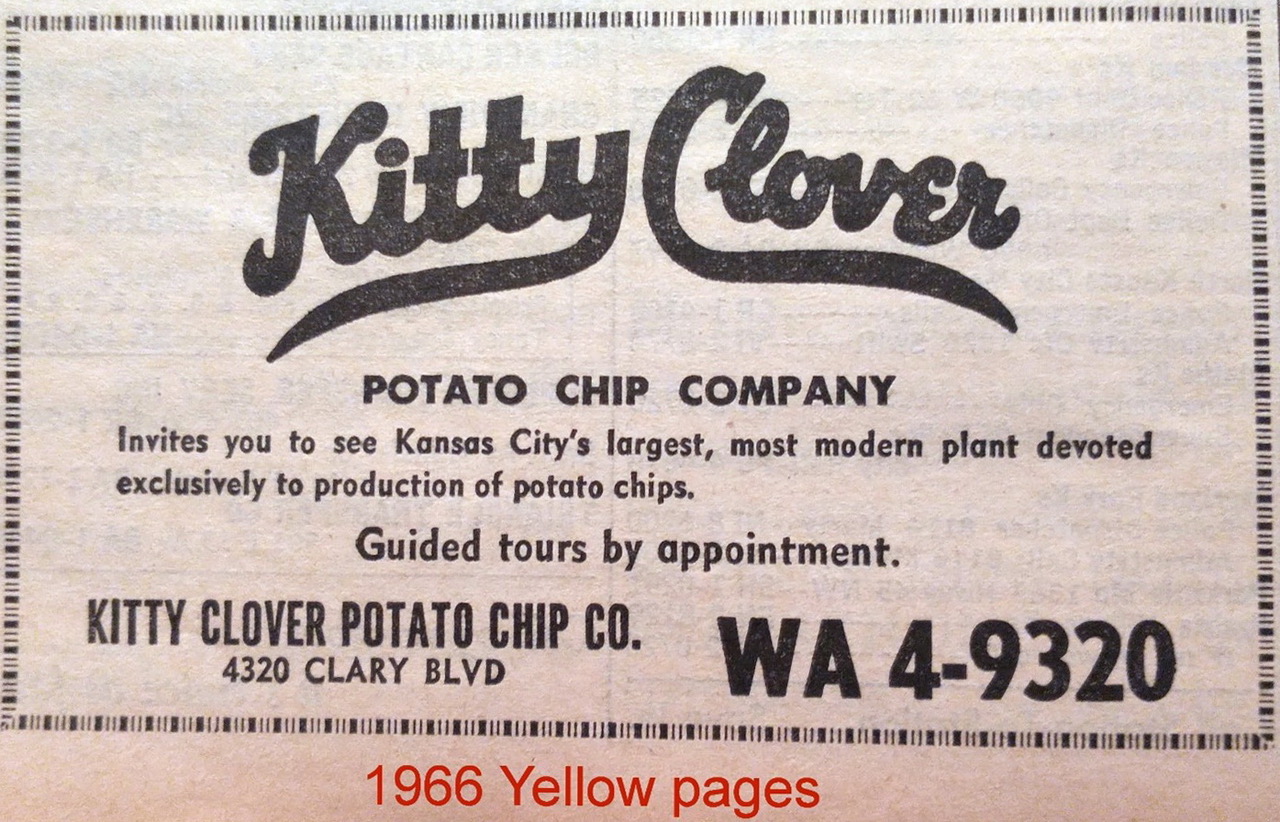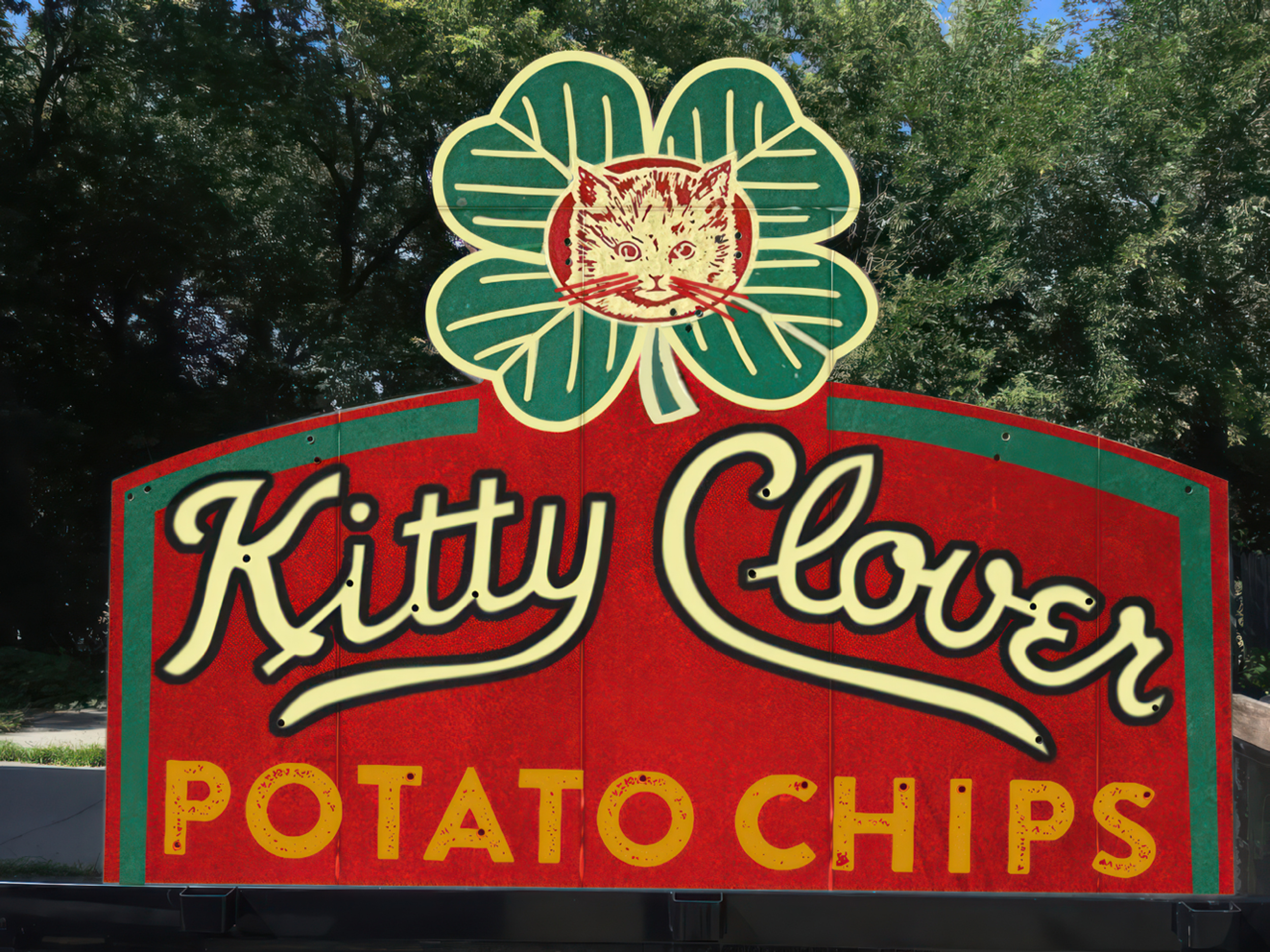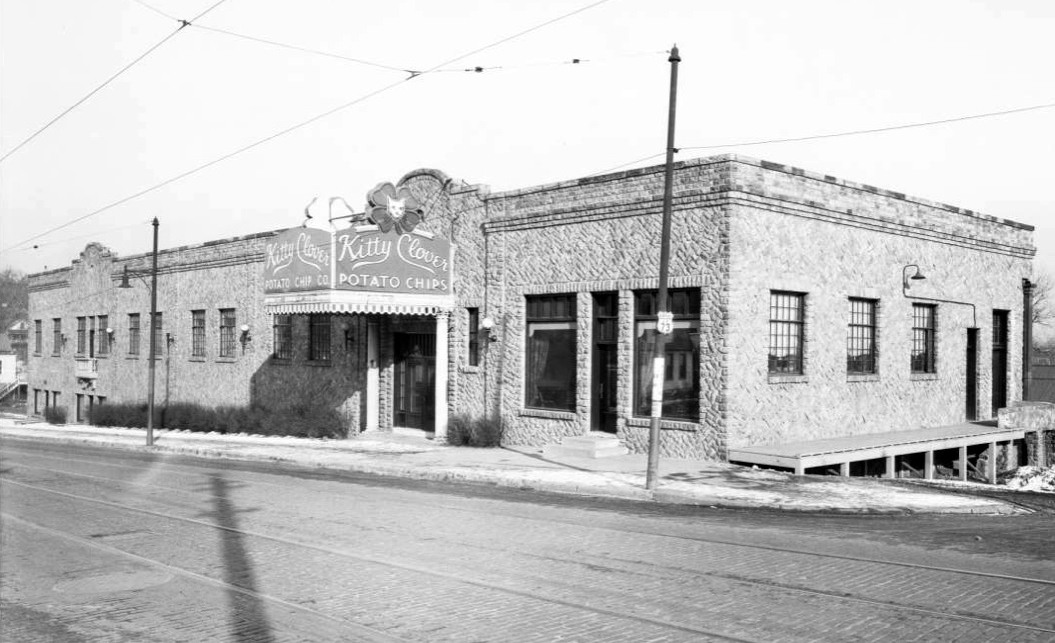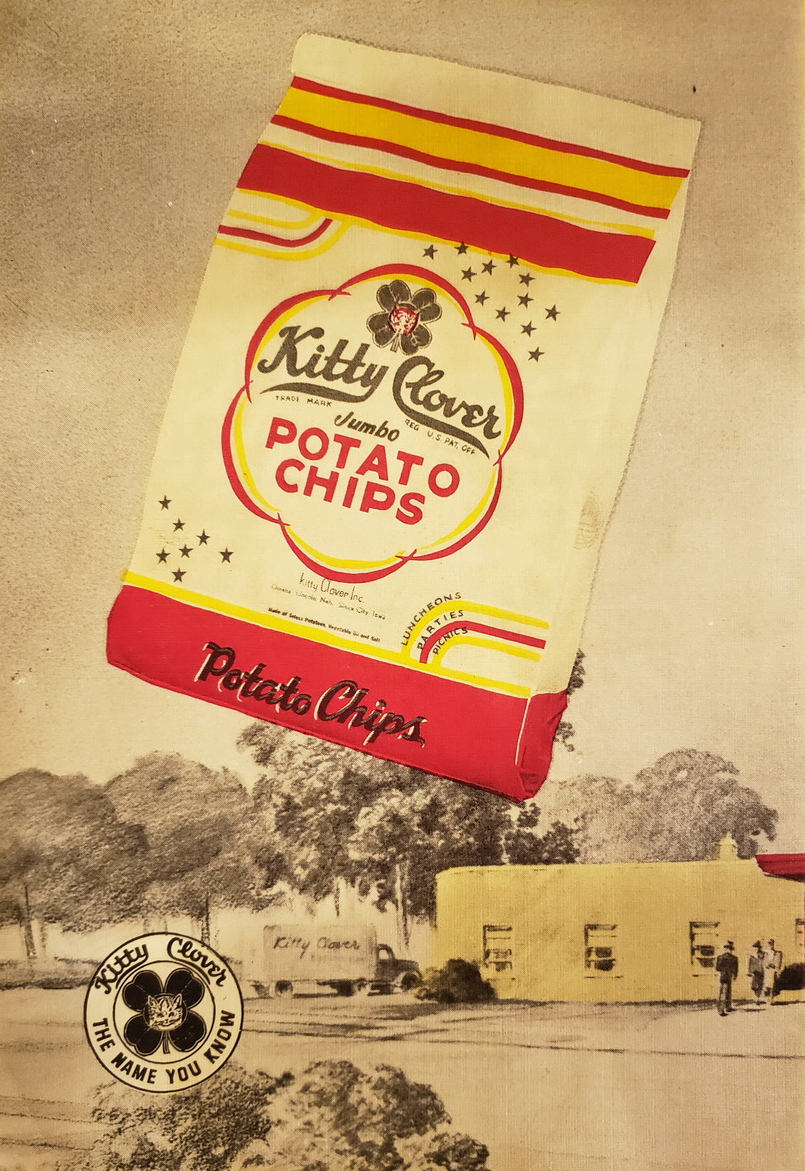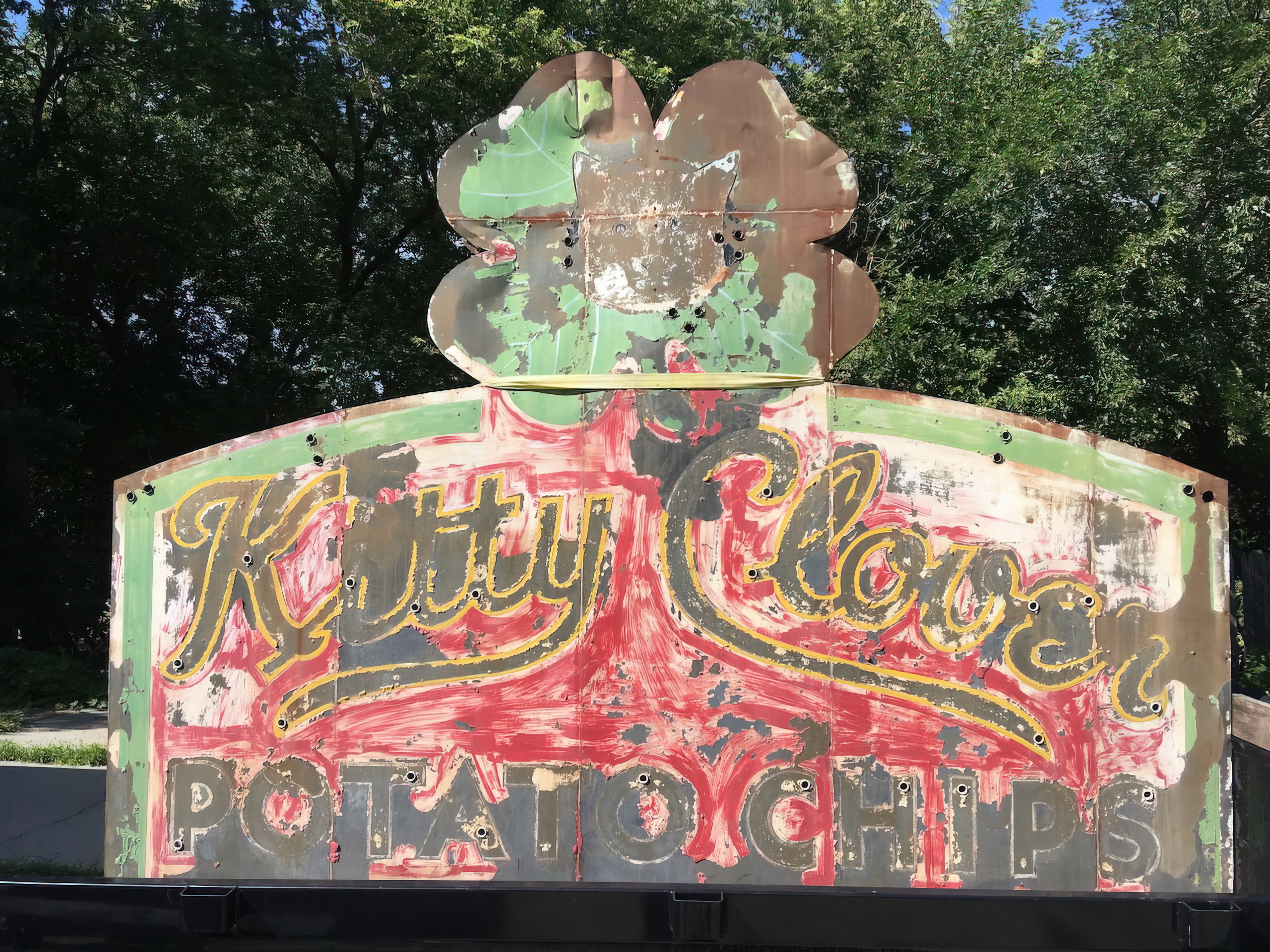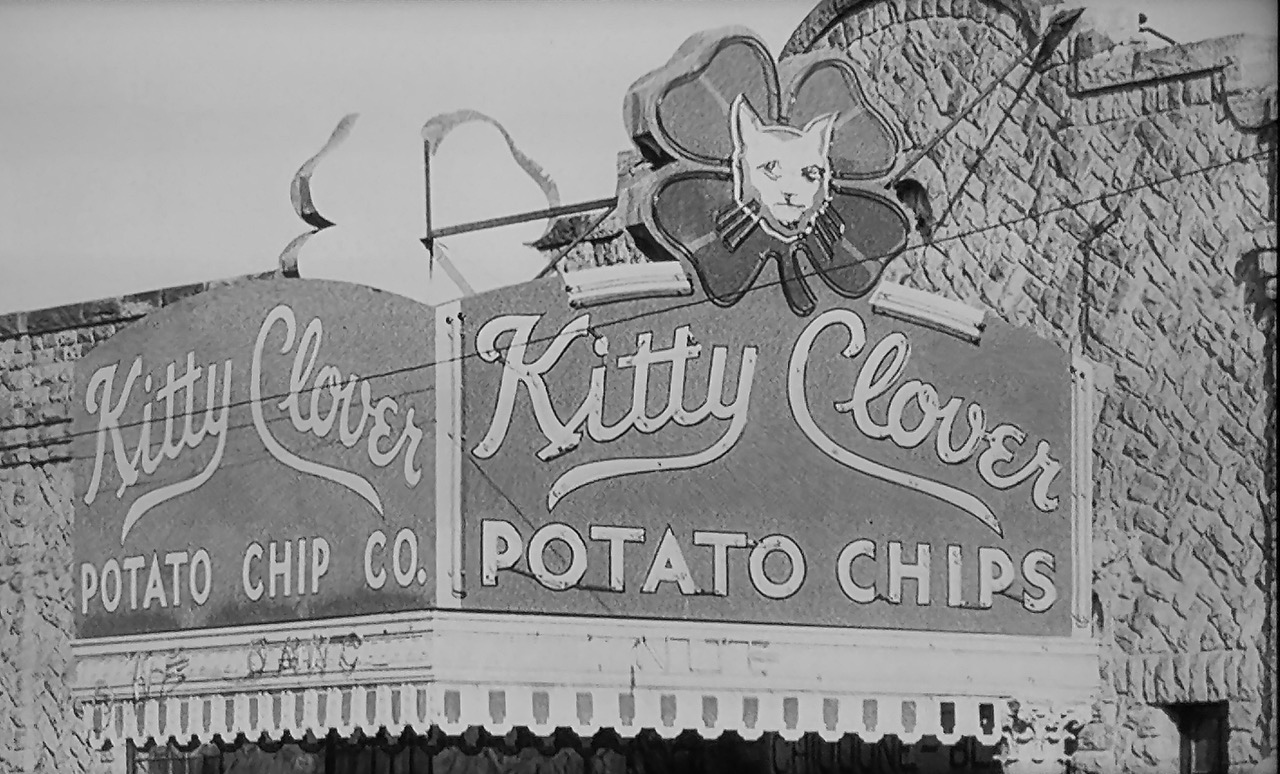Kitty Clover Potato Chips
Kitty Clover Potato Chips
To “find something for the boy to do” in job-scarce 1932, Fred and Louvana (Lou) Lippold of Omaha’s Lippold Insurance Agency answered the call of a small newspaper ad, purchasing a tiny potato chip business for their 18-year-old son, Harold. The company included a name, a logo, a large kettle, a hand-operated potato peeler, a slicer, some bags, and a stapler. For $150, the Kitty Clover Potato Chip Company was reborn and destined to become the largest manufacturer of its kind.
Harold peeled, sliced, cooked, bagged, and delivered the chips himself, initially from a 17 x 25-foot room at 16th and Cuming Streets in Omaha, Nebraska. His father helped in the evenings; his mother kept the books. Harold traded 40 percent of his business for the use of the family car to make sales calls and deliveries. Kitty Clover soon landed at 1101-17 South 24th Street, at Pierce Street. Built by Italian masons using stones from the Douglas County Courthouse, this first official Kitty Clover plant was originally a dance hall.
By 1952, Harold, along with his father, mother, and other Lippold family members, opened their ultra-modern, 80,000 square foot facility at 2200 South 24th Street in Omaha. Processing 2200 to 2400 pounds of potatoes per hour, and up to 24 100-pound bags per day, Kitty Clover was officially the world’s largest manufacturer producing potato chips exclusively and remained so until closing in 1987.
It was said Kitty Clover became so large and powerful it had its own strain of Idaho potatoes, delivered by train directly to its factory. Distribution included Nebraska and portions of Iowa, South Dakota, Minnesota, Missouri, and Kansas. Eventually, they served nine midwestern states.
In 1959, Kitty Clover sold to Fairmont Foods for an undisclosed amount of cash. Fairmont hoped to augment its dairy business with a more diverse product offering to a wider market. At this point, many Lippold family members branched out on their own, taking the Kitty Clover name with them.
In 1956, Kitty Clover opened a Kansas City factory at 817 Westport Road, followed by a second at 4320 Clary Blvd. However, records show the company had a history in Kansas City as early as 1940 at 3718 Main Street. Whether this location was a manufacturing plant or simply a retail facility is unknown.
Through a series of acquisitions, mergers, and sales, the use of the Kitty Clover name was discontinued by the mid-1980s. The last known use of the brand name was in 1986 on a collection of Kansas City Royals baseball cards featuring the 1985 World Series players. The cards were included in bags of Kitty Clover chips.
LUMI is indebted to David Vonk, neon sign photographer, collector, and YouTubing preservationist of Omaha, Nebraska. David graciously donated two Kitty Clover Potato Chip neon signs to LUMI. Both signs hung on the canopy of the Kitty Clover factory at 24th and Pierce Streets, as early as 1935. Not taken to the new facility in 1952, they ultimately turned up in an antique auction where David acquired them in 2018.
These Kitty Clover contributions, along with two other neon gifts from David, expand not only our collection but our geographic scope—with these important new additions, LUMI becomes a regional neon sign museum. For those of us who once enjoyed Kitty Clover Potato Chips from our school lunch boxes, we could not be more pleased to brighten our presence in Kansas City and beyond with this iconic brand.
To “find something for the boy to do” in job-scarce 1932, Fred and Louvana (Lou) Lippold of Omaha’s Lippold Insurance Agency answered the call of a small newspaper ad, purchasing a tiny potato chip business for their 18-year-old son, Harold. The company included a name, a logo, a large kettle, a hand-operated potato peeler, a slicer, some bags, and a stapler. For $150, the Kitty Clover Potato Chip Company was reborn and destined to become the largest manufacturer of its kind.
Harold peeled, sliced, cooked, bagged, and delivered the chips himself, initially from a 17 x 25-foot room at 16th and Cuming Streets in Omaha, Nebraska. His father helped in the evenings; his mother kept the books. Harold traded 40 percent of his business for the use of the family car to make sales calls and deliveries. Kitty Clover soon landed at 1101-17 South 24th Street, at Pierce Street. Built by Italian masons using stones from the Douglas County Courthouse, this first official Kitty Clover plant was originally a dance hall.
By 1952, Harold, along with his father, mother, and other Lippold family members, opened their ultra-modern, 80,000 square foot facility at 2200 South 24th Street in Omaha. Processing 2200 to 2400 pounds of potatoes per hour, and up to 24 100-pound bags per day, Kitty Clover was officially the world’s largest manufacturer producing potato chips exclusively and remained so until closing in 1987.
It was said Kitty Clover became so large and powerful it had its own strain of Idaho potatoes, delivered by train directly to its factory. Distribution included Nebraska and portions of Iowa, South Dakota, Minnesota, Missouri, and Kansas. Eventually, they served nine midwestern states.
In 1959, Kitty Clover sold to Fairmont Foods for an undisclosed amount of cash. Fairmont hoped to augment its dairy business with a more diverse product offering to a wider market. At this point, many Lippold family members branched out on their own, taking the Kitty Clover name with them.
In 1956, Kitty Clover opened a Kansas City factory at 817 Westport Road, followed by a second at 4320 Clary Blvd. However, records show the company had a history in Kansas City as early as 1940 at 3718 Main Street. Whether this location was a manufacturing plant or simply a retail facility is unknown.
Through a series of acquisitions, mergers, and sales, the use of the Kitty Clover name was discontinued by the mid-1980s. The last known use of the brand name was in 1986 on a collection of Kansas City Royals baseball cards featuring the 1985 World Series players. The cards were included in bags of Kitty Clover chips.
LUMI is indebted to David Vonk, neon sign photographer, collector, and YouTubing preservationist of Omaha, Nebraska. David graciously donated two Kitty Clover Potato Chip neon signs to LUMI. Both signs hung on the canopy of the Kitty Clover factory at 24th and Pierce Streets, as early as 1935. Not taken to the new facility in 1952, they ultimately turned up in an antique auction where David acquired them in 2018.
These Kitty Clover contributions, along with two other neon gifts from David, expand not only our collection but our geographic scope—with these important new additions, LUMI becomes a regional neon sign museum. For those of us who once enjoyed Kitty Clover Potato Chips from our school lunch boxes, we could not be more pleased to brighten our presence in Kansas City and beyond with this iconic brand.
